NEEDED: REAL HEALTH CARE REFORM
Almost all of our contributors agree that spiraling health care costs could bankrupt the country and sap the investment dollars needed to jumpstart the economy. Here's what they said:

We will not solve the health care financial debate by changing insurance coverage because obesity-driven ailments will bankrupt any plan devised by even the wisest legislators ...
Instead, we need to make it easy to make the healthy decisions in our communities. The battle needs to be waged in our kitchens, living rooms, and bedrooms. And changing the culture around healthy living depends on each of us understanding that we are all stakeholders. We need to see weight loss as a patriotic move that improves our ability to compete in business and balance our accounts.
- Dr. Mehmet Oz, Author and TV Host
-------------
 Controlling the budget is impossible unless we control health costs. Controlling health costs is impossible while we pay for almost all treatments demanded by eligibles. We have to put health costs on a strict budget, much as the health systems of Canada and the U.K. We can start by using income-related, subsidized vouchers for the purchase of Medicare insurance and a block grant for Medicaid.
Controlling the budget is impossible unless we control health costs. Controlling health costs is impossible while we pay for almost all treatments demanded by eligibles. We have to put health costs on a strict budget, much as the health systems of Canada and the U.K. We can start by using income-related, subsidized vouchers for the purchase of Medicare insurance and a block grant for Medicaid.
- Rudolph Penner, Fellow, Urban Institute
-------------
 Rising health care costs are the largest cause of projected federal deficits, and the new health reform law contains a wide range of measures that can restructure the nation's health system and slow the growth of costs. It establishes insurance exchanges that can foster competition among health plans based on price and quality, reduces overpayments to the private insurance plans that participate in Medicare, and discourages high-cost insurance plans by imposing an excise tax on them. If fully implemented, these and other provisions of health reform will start bending the "cost curve" projections of soaring health care costs in the years to come.
Rising health care costs are the largest cause of projected federal deficits, and the new health reform law contains a wide range of measures that can restructure the nation's health system and slow the growth of costs. It establishes insurance exchanges that can foster competition among health plans based on price and quality, reduces overpayments to the private insurance plans that participate in Medicare, and discourages high-cost insurance plans by imposing an excise tax on them. If fully implemented, these and other provisions of health reform will start bending the "cost curve" projections of soaring health care costs in the years to come.
'We must aggressively reform the health care payment and delivery system by conducting a wide range of pilot and demonstration projects.'
But that will not be enough. We also must aggressively reform the health care payment and delivery system by conducting a wide range of pilot and demonstration projects, establishing a new Medicare payment method to reward accountable care organizations, conducting more research on the comparative effectiveness of different medical procedures and treatments, and creating an Independent Payment Advisory Board to develop proposals to slow Medicare and private health spending and improve the quality of care. And we must implement the results as they emerge.
Health reform begins the process of testing, experimenting, and implementing that health experts agree is needed to slow the growth of health care costs in the coming years. We must move boldly down that path.
- Robert Greenstein, Executive Director, Center on Budget and Policy Priorities
-------------
 If the past is prologue, the one area of huge national expenditure most likely to rise rapidly in the coming years is health care.
If the past is prologue, the one area of huge national expenditure most likely to rise rapidly in the coming years is health care.
Not surprisingly, it is also an area particularly susceptible to waste and profiteering - particularly because so much of the spending will predictably go toward increasingly complex and expensive new technologies that hospitals and physicians will seize upon as absolutely necessary to their efforts in diagnosis and treatment. But misuse and overuse of technology has contributed massive amounts to the cost of care. Oversight has now become mandatory, and it should be done through the Institute of Medicine. In addition to savings created by such means, billions will be spared by attention to the following factors, each of which adds considerably to the total bill for our nation's health care:
- Physician entrepreneurship and advertising.
- Competition between individual health care facilities, which results in duplication of personnel and resources; the large expense of advertisements and other forms of publicizing; more efficient centralization of resources (including the elimination of some clinics and hospitals) can eliminate considerable waste.
- A tort system rife with opportunity for misbegotten gains.
- Overspecialization, and oversupply of expensive personnel. We should determine the nation's medical manpower needs, mandating the training of only the number of specialists required and providing incentives to encourage family practice. We should also explore the effectiveness and increased utilization of highly trained nurses, physician assistants and similar personnel.
- Our current non-system of preventive medicine, despite all the lip-service devoted to its crucial importance.
- Dr. Sherwin Nuland, Clinical Professor of Surgery at Yale University
 Heart disease, prostate cancer and diabetes can be largely prevented and even reversed by making changes in diet and lifestyle. Medicare is now covering our program for reversing heart disease, which is a good start, but I'd like to see them expand that to other chronic diseases as well.
Heart disease, prostate cancer and diabetes can be largely prevented and even reversed by making changes in diet and lifestyle. Medicare is now covering our program for reversing heart disease, which is a good start, but I'd like to see them expand that to other chronic diseases as well.
We spent $100 billion last year on bypass surgery, angioplasties and stents, which studies show don't prolong life and don't prevent heart attacks. So we pay for things that are dangerous, invasive, expensive and largely ineffective, yet lifestyle changes can prevent and reverse most chronic diseases at a fraction of the cost. When my own patients make lifestyle changes, most find that they feel so much better so quickly. We need to move from a fear of dying to a joy for living and it's joy that is really sustainable.
This is the first generation of people that may live a shorter lifespan than their parents. It doesn't matter if you're a Republican or a Democrat. This is an issue that can bring everyone together.
- Dr. Dean Ornish, President and Founder of the Preventive Medicine Research Institute
-------------
 Crucial to our fiscal future is attacking childhood obesity via effective elementary school programs. If we do not act now, the burden of chronic disease will overwhelm our health care system (however it is set up) in the not so distant future.
Crucial to our fiscal future is attacking childhood obesity via effective elementary school programs. If we do not act now, the burden of chronic disease will overwhelm our health care system (however it is set up) in the not so distant future.
- Dr. Arthur Agatston, Associate Professor of Medicine, University of Miami Miller School of Medicine
A CALL TO PUBLIC SERVICE
 Okay, how about this for an impossible dream? Mandatory national service. The Lend a Hand Corps.
Okay, how about this for an impossible dream? Mandatory national service. The Lend a Hand Corps.
It's a fast and pull-together boot camp for our collective injured psyche and a chance to repair our shattered social contract. Start immediately with one year service at age 18. Every student in America takes a gap year paid for by TARP funds. After that, let's try the method of the Israel army. Every American, rich and poor, the halt, the weak, the lame, clocks in two weeks every other year until retirement. Employers underwrite salaries. No exceptions except for medical reasons and childcare. Let the well-off work alongside the marginally employed or be under their command. Residency in dormitories is required. Anyone who is able must teach, mentor, volunteer. A model for this effort can be found at the Corporation for National and Community Service. The financing can come from stimulus funds.
The National Service Corps must include the disabled and mentally challenged, so we can overcome our stigma and fear of the other. And silence, a necessary focus and retreat: No BlackBerries, cell phones or Internet unless it is mandated by the job.
- Marie Brenner, Author and Writer-at-Large for Vanity Fair
GLOBAL COMPETITION AND THE KNOWLEDGE ECONOMY
 America's fiscal future resides most significantly in its human capital, which we are wasting at an unconscionable rate. Other than the basic guarantees of life and liberty provided by adequate health care for all and a careful balancing of rights and duties, it is education that matters most in assuring the third of those unalienable rights proclaimed by the Declaration - what Aristotle meant by eudaimonia and Jefferson by "the pursuit of happiness," which is nothing more or less than a reasonable shot at the realization of each person's own highest natural potential. That in turn requires a greater commitment to education at every level. As a college president, I am, of course, concerned that we are no longer a top ten nation in the percentage of our population attaining undergraduate degrees. But I am far more dismayed by the neglect of our children at the other end of the educational spectrum, especially when we know so clearly what can be done in this regard to rebuild our human infrastructure and restore our sense of national purpose.
America's fiscal future resides most significantly in its human capital, which we are wasting at an unconscionable rate. Other than the basic guarantees of life and liberty provided by adequate health care for all and a careful balancing of rights and duties, it is education that matters most in assuring the third of those unalienable rights proclaimed by the Declaration - what Aristotle meant by eudaimonia and Jefferson by "the pursuit of happiness," which is nothing more or less than a reasonable shot at the realization of each person's own highest natural potential. That in turn requires a greater commitment to education at every level. As a college president, I am, of course, concerned that we are no longer a top ten nation in the percentage of our population attaining undergraduate degrees. But I am far more dismayed by the neglect of our children at the other end of the educational spectrum, especially when we know so clearly what can be done in this regard to rebuild our human infrastructure and restore our sense of national purpose.
- Ben Dunlap, President, Wofford College, SC
-------------

'As recently as the 1980s we led the world in college graduates, but today, the U.S. ranks 12th among 36 of the wealthiest nations.'
I would maintain and grow state and federal funding for public higher education. America is slipping behind its global competitors. As recently as the 1980s we led the world in college graduates, but today, the U.S. ranks 12th among 36 of the wealthiest nations. A college degree is essential to maintaining economic growth. With private colleges pricing themselves out of the market, public higher education is more important than ever. We know that individuals with a college degree fare far better in the job market than those without one. Higher education is the key to a middle-class lifestyle, and we must make sure that it is accessible to all who seek it - for their own sake and for the sake of the country.
- Jennifer Raab, President, Hunter College

If I had a magic wand I would radically expand the resources we devote to the education of our citizens, from childhood into adulthood. The root of America's long-term success will inevitably be the quality of its education system. This is a painful truth which seems almost willfully disregarded by most Americans. If we don't have educated citizens, we will not be able to innovate and create new ideas and the products and services that manifest them.
Increasingly the greatest societal value is going to be generated by the most sophisticated technological products - we see this today in the iPhone, Facebook, Google, Twitter, etc. Yet such products will only be created by people who are well educated. This is better understood in China than it is here in the U.S.
The need to create a workforce that can come up with cutting edge ideas and turn them into products and services is central not only to our fiscal future, but to our very national relevance. There is no divine right for the U.S. to remain the dominant global economy. Students and policymakers in countries around the world are increasingly aware of the need to study math and science and gain the technological skills of the modern age.
- David Kirkpatrick, Author, The Facebook Effect: The Inside Story of the Company that is Connecting the World
-------------
 The most important thing we can do to secure America's future is to ensure that every child in this country - regardless of skin color and ZIP code - receives an excellent education. Recently a television anchor reminded me that in a ranking of Americans' top concerns, the economy was at the top of the list, while education was the most important to only 6 percent of Americans. Especially considering the economic reality we face right now, I hope more people will soon see this disconnect and how damaging it is. The only way this nation can secure its future and regain its positioning in the global marketplace is by improving the education system, and we'll never be able to compete unless we are producing a well skilled workforce. The most important thing we can do to ensure our economic security is to create excellent schools for our children, even if we have to stake everything on the effort to see it through.
The most important thing we can do to secure America's future is to ensure that every child in this country - regardless of skin color and ZIP code - receives an excellent education. Recently a television anchor reminded me that in a ranking of Americans' top concerns, the economy was at the top of the list, while education was the most important to only 6 percent of Americans. Especially considering the economic reality we face right now, I hope more people will soon see this disconnect and how damaging it is. The only way this nation can secure its future and regain its positioning in the global marketplace is by improving the education system, and we'll never be able to compete unless we are producing a well skilled workforce. The most important thing we can do to ensure our economic security is to create excellent schools for our children, even if we have to stake everything on the effort to see it through.
- Michelle Rhee, Chancellor of Washington, D.C. Schools
PRIORITY NUMBER ONE: A SUSTAINABLE FISCAL FUTURE
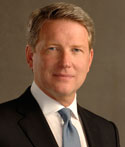 "We will not secure America's fiscal future until we learn, as a government and as a country, to treat "spending" entirely differently from "investing." We must reduce our spending in every way possible; we must at the same time start investing far more than we are. The prosperity we have enjoyed in this generation is because of the investments made by those who came before - in education and in infrastructure (think the GI Bill and our national highway system). Our fathers and mothers sacrificed to give us the economic engine we have; we owe our sons and daughters no less sacrifice to re-build that engine for the 21st century."
"We will not secure America's fiscal future until we learn, as a government and as a country, to treat "spending" entirely differently from "investing." We must reduce our spending in every way possible; we must at the same time start investing far more than we are. The prosperity we have enjoyed in this generation is because of the investments made by those who came before - in education and in infrastructure (think the GI Bill and our national highway system). Our fathers and mothers sacrificed to give us the economic engine we have; we owe our sons and daughters no less sacrifice to re-build that engine for the 21st century."
- David Westin, President, ABC News
-------------
 The federal budget is drifting into a future of huge deficits or unprecedented tax increases, or both. We have seen the clouds gathering for years but haven't adjusted federal retirement programs or taken other steps to reduce entitlements. We have to gradually tie benefits more to income; raise the eligibility age for Social Security and Medicare, perhaps by one month for each two-month increase in average life expectancy; and find ways to reduce the cost-of-living increases on Social Security benefits for wealthy seniors by slowly increasing their Medicare premiums and leaving everybody else's untouched. We have to do what governors do - cut spending or increase revenues in some combination that will begin to pull us back from the cliff.
The federal budget is drifting into a future of huge deficits or unprecedented tax increases, or both. We have seen the clouds gathering for years but haven't adjusted federal retirement programs or taken other steps to reduce entitlements. We have to gradually tie benefits more to income; raise the eligibility age for Social Security and Medicare, perhaps by one month for each two-month increase in average life expectancy; and find ways to reduce the cost-of-living increases on Social Security benefits for wealthy seniors by slowly increasing their Medicare premiums and leaving everybody else's untouched. We have to do what governors do - cut spending or increase revenues in some combination that will begin to pull us back from the cliff.
- Mortimer Zuckerman, Editor-in-Chief, U.S. News and World Report
-------------
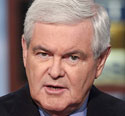 We need to control spending and boost economic growth. From 1995 to 1999, we focused on establishing spending priorities and reforming government programs. The result was an average annual increase in government spending of just 2.9 percent (including entitlements), the lowest rate of increase since Calvin Coolidge in the 1920s. We need that same commitment today. We also cut taxes, fueling an economic boom. Today, a tax cut program like the American Solutions Jobs First plan (Congressman Jordan has introduced a similar plan in Congress called the Economic Freedom Act) would lead to more jobs, less unemployment expenses and further reduce the deficit.
We need to control spending and boost economic growth. From 1995 to 1999, we focused on establishing spending priorities and reforming government programs. The result was an average annual increase in government spending of just 2.9 percent (including entitlements), the lowest rate of increase since Calvin Coolidge in the 1920s. We need that same commitment today. We also cut taxes, fueling an economic boom. Today, a tax cut program like the American Solutions Jobs First plan (Congressman Jordan has introduced a similar plan in Congress called the Economic Freedom Act) would lead to more jobs, less unemployment expenses and further reduce the deficit.
- Newt Gingrich, Chairman of American Solutions
-------------
 On a national level, we've gone from being an economy where we make things to an economy where we make things up. Default credit swaps, derivatives, CDOs and the like have turned Wall Street into a casino (actually, a casino is fairer: at least you know the odds going in). But there are many things we can do, right now, to take financial matters into our own hands, and move our families to safer financial ground. We can start by upping our financial literacy, and by recognizing that the companies offering us mortgages and easy credit are not on our side. In fact, they are looking to cash in on us. We need to learn to protect ourselves and our families from their tricks and traps. Tricks in the ways we finance our homes. Traps in the way credit card companies have used hidden fees, fine print and skyrocketing interest rates to get their hands on our money. "Service providers" may appear friendly, but they are not your friends. This is financial combat. If you want you and your family to survive, you need to learn how to spot the financial land mines buried in your mortgage and credit card contracts, and keep yourself out of harm's way.
On a national level, we've gone from being an economy where we make things to an economy where we make things up. Default credit swaps, derivatives, CDOs and the like have turned Wall Street into a casino (actually, a casino is fairer: at least you know the odds going in). But there are many things we can do, right now, to take financial matters into our own hands, and move our families to safer financial ground. We can start by upping our financial literacy, and by recognizing that the companies offering us mortgages and easy credit are not on our side. In fact, they are looking to cash in on us. We need to learn to protect ourselves and our families from their tricks and traps. Tricks in the ways we finance our homes. Traps in the way credit card companies have used hidden fees, fine print and skyrocketing interest rates to get their hands on our money. "Service providers" may appear friendly, but they are not your friends. This is financial combat. If you want you and your family to survive, you need to learn how to spot the financial land mines buried in your mortgage and credit card contracts, and keep yourself out of harm's way.
- Arianna Huffington, Editor-in-Chief, The Huffington Post
-------------

The largest generation in American history is beginning to retire, adding significant stress to Social Security and Medicare, two programs that provide essential support to retired Americans. We need to rethink, repair and restart America's retirement system.
A secure retirement for all workers should incorporate guaranteed income for life, which would supplement Social Security and provide a floor of income to cover basic lifetime needs. Pensions provide a steady stream of lifetime income, but they are increasingly rare among American workers. Annuities, which also provide guaranteed income, can be a dependable solution for many workers who don't have a pension.
The most important step individuals can take is to save more money now. McKinsey & Company projects that the average household will find itself $250,000 short of what it needs to retire securely.
To bridge this gap, employers and policymakers should encourage workers to save earlier, and to put aside sufficient savings - about 10 to 15 percent of income.
As they seek to make the right choices with their savings, people should have access to diversified, low-cost investments, as well as sound, objective investment advice. If we take these steps today, we can begin the process of repairing America's retirement system and putting our nation on firmer financial footing.
- Roger Ferguson, Former Vice Chairman of the Federal Reserve
...AND A NEW POLITICAL CONSTRUCT
 America's fiscal future is probably beyond redemption. The only possible hope is a radical abolition of crony capitalism and money-driven interest group politics. That, in turn, would require that House and Senate members be limited to single six- or eight-year terms (staggered), and that elections be 100 percent financed with public funds. This seems wholly unlikely, yet if things get desperate enough, perhaps the mice will figure out how to bell the cat after all.
America's fiscal future is probably beyond redemption. The only possible hope is a radical abolition of crony capitalism and money-driven interest group politics. That, in turn, would require that House and Senate members be limited to single six- or eight-year terms (staggered), and that elections be 100 percent financed with public funds. This seems wholly unlikely, yet if things get desperate enough, perhaps the mice will figure out how to bell the cat after all.
- David Stockman, Former OMB Director under Ronald Reagan; Founder, Heartland Industrial Partners
-------------
 I would restore the pre-Bush higher income tax rates on the top two percent of taxpayers. At the same time, I would raise the income threshold subject to the higher tax to $350,000, and simultaneously create a legal lockbox to ensure these tax proceeds to are used only for national debt reduction. Everyone must make sacrifices for our country's economic benefit, and the rich should be the first to be called upon, if we are to ask those on Medicare and Social Security to accept a reduction in their benefits.
I would restore the pre-Bush higher income tax rates on the top two percent of taxpayers. At the same time, I would raise the income threshold subject to the higher tax to $350,000, and simultaneously create a legal lockbox to ensure these tax proceeds to are used only for national debt reduction. Everyone must make sacrifices for our country's economic benefit, and the rich should be the first to be called upon, if we are to ask those on Medicare and Social Security to accept a reduction in their benefits.
- Ed Koch, Former Mayor of New York
-------------
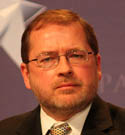 Limit congressmen to only six years on the Appropriations Committee. For all new hires by government, shift from unfunded defined benefit pensions to fully funded defined contribution pensions, such as 401(k)s. Block grant all federal aid to states and remove all mandates. Freeze the total amount of the block grants. Require that any legislation that spends money be put online for all Americans to read for five working days before the House or Senate can vote on it. Pay federal and state workers no more than private sector workers: pay, benefits and pensions. Abolish the Davis-Bacon law that artificially increases the cost of all highways and construction. Don't invade or occupy countries the president cannot pronounce or find on a map.
Limit congressmen to only six years on the Appropriations Committee. For all new hires by government, shift from unfunded defined benefit pensions to fully funded defined contribution pensions, such as 401(k)s. Block grant all federal aid to states and remove all mandates. Freeze the total amount of the block grants. Require that any legislation that spends money be put online for all Americans to read for five working days before the House or Senate can vote on it. Pay federal and state workers no more than private sector workers: pay, benefits and pensions. Abolish the Davis-Bacon law that artificially increases the cost of all highways and construction. Don't invade or occupy countries the president cannot pronounce or find on a map.
- Grover Norquist, President, Americans for Tax Freedom
-------------
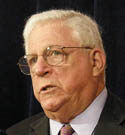 The GAO estimates that by 2011, government spending - federal, state, and local - will total $6.7 trillion, or 40 percent of GDP. Fully half of this amount, $3.4 trillion, will be spent not by Washington but by state and local governments. There are 2 million civilian federal employees, but states and localities have 15 million full-time, and almost five million part-time, employees. This should not be a surprise. States and their localities have primary responsibility for delivering the government services that most directly affect citizens - their health, their physical infrastructure, and the education of their children. If the states' fiscal incapacity persists, it will have enormous consequences for not only the level and quality of government services, but the stability of national financial markets and the fiscal pressures on the federal government. Because of the fiscal pressures on both state and federal governments, there is concern that there could be a growing disconnect between the states and Congress, thus raising more fundamental issues of American federalism.
The GAO estimates that by 2011, government spending - federal, state, and local - will total $6.7 trillion, or 40 percent of GDP. Fully half of this amount, $3.4 trillion, will be spent not by Washington but by state and local governments. There are 2 million civilian federal employees, but states and localities have 15 million full-time, and almost five million part-time, employees. This should not be a surprise. States and their localities have primary responsibility for delivering the government services that most directly affect citizens - their health, their physical infrastructure, and the education of their children. If the states' fiscal incapacity persists, it will have enormous consequences for not only the level and quality of government services, but the stability of national financial markets and the fiscal pressures on the federal government. Because of the fiscal pressures on both state and federal governments, there is concern that there could be a growing disconnect between the states and Congress, thus raising more fundamental issues of American federalism.
- Richard Ravitch, Lieutenant Governor, State of New York
-------------
 States and municipalities face a dangerous trillion dollar-plus shortfall in their pension obligations. The reasons for this are not hard to find: refusal of states to fund the systems, the losses suffered in 2008, and human error. The three choices faced by the states are clearly untenable: massive tax increases; ghastly budget reductions which would result in school years slashed, police and firefighters fired, and the early release of prisoners ... all of which is already happening; and breaking contracts (probably illegal) with retirees who have relied on this security for their old age - given that they are not even eligible for Social Security. By postponing decisions, we are increasing uncertainty in financial markets, and committing future generations to make even more difficult choices. One part of the solution would be for the Federal Government to allow states that meet certain criteria to issue federal tax-exempt bonds to fund pension contributions - something they cannot do at present. This solution will keep financing costs low and thereby protect taxpayers, stabilize state budgets, and secure a stable future for retirees. To ensure that the proposed mechanism is sustainable, states will have to do their part and be subject to criteria that would include ensuring a more robust investment management oversight, realistic estimates on investment returns, retirement ages that take account of longer lives, and more efficient ways to deliver health care.
States and municipalities face a dangerous trillion dollar-plus shortfall in their pension obligations. The reasons for this are not hard to find: refusal of states to fund the systems, the losses suffered in 2008, and human error. The three choices faced by the states are clearly untenable: massive tax increases; ghastly budget reductions which would result in school years slashed, police and firefighters fired, and the early release of prisoners ... all of which is already happening; and breaking contracts (probably illegal) with retirees who have relied on this security for their old age - given that they are not even eligible for Social Security. By postponing decisions, we are increasing uncertainty in financial markets, and committing future generations to make even more difficult choices. One part of the solution would be for the Federal Government to allow states that meet certain criteria to issue federal tax-exempt bonds to fund pension contributions - something they cannot do at present. This solution will keep financing costs low and thereby protect taxpayers, stabilize state budgets, and secure a stable future for retirees. To ensure that the proposed mechanism is sustainable, states will have to do their part and be subject to criteria that would include ensuring a more robust investment management oversight, realistic estimates on investment returns, retirement ages that take account of longer lives, and more efficient ways to deliver health care.
- Kathleen Townsend, Former Lieutenant Governor of Maryland
NOTHING WORKS WITHOUT JOBS, JOBS, JOBS!
Encourage people to start their own businesses and hope that financing is more hospitable. Jobs drive this country's success. Lastly, we must live within our means.
- Cathie Black, Chairman, Hearst Magazines
 I believe more strongly than ever that the best way, and perhaps the only way, to secure America's fiscal health is to support groundbreaking start-ups and passionate entrepreneurs. We cannot focus only on fixing what exists now, but we must provide the best and the brightest with the tools that they need to start the next generation of great American companies.
I believe more strongly than ever that the best way, and perhaps the only way, to secure America's fiscal health is to support groundbreaking start-ups and passionate entrepreneurs. We cannot focus only on fixing what exists now, but we must provide the best and the brightest with the tools that they need to start the next generation of great American companies.
-Jane Friedman, CEO and Co-Founder of Open Road Integrated Media
-------------
 We need to educate individuals in order to foster wide spread change in expectations, and as citizens take greater responsibility for our economic future. We will have to begin to accept the reality that our government cannot cure unemployment without help from business, and we will have to assume some costs for education, retirement and health insurance. To realize these goals, we must be open-minded, challenge basic assumptions, and force ourselves not only to see what's there, but also consciously uncover what is missing. Collectively, this type of thinking will spark imaginative and artful solutions that have the promise to help ignite America's fiscal future.
We need to educate individuals in order to foster wide spread change in expectations, and as citizens take greater responsibility for our economic future. We will have to begin to accept the reality that our government cannot cure unemployment without help from business, and we will have to assume some costs for education, retirement and health insurance. To realize these goals, we must be open-minded, challenge basic assumptions, and force ourselves not only to see what's there, but also consciously uncover what is missing. Collectively, this type of thinking will spark imaginative and artful solutions that have the promise to help ignite America's fiscal future.
- Edward B. Burger Professor of Mathematics and Lissack Professor for Social Responsibility and Personal Ethics at Williams College
-------------
Corporate Responsibility in an Age of Greed
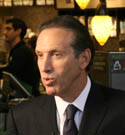
Healthy, thriving neighborhoods are the foundation for America's fiscal stability and growth. When we strengthen our communities, we strengthen our future. Our cities need local entrepreneurs to serve as catalysts for positive, relevant change. By innovating and addressing core issues, change-makers open doors for not only job creation, but broader solutions for the economy and society. I've seen firsthand how the efforts of community change-makers like Geoffrey Canada, president and CEO of Harlem Children's Zone, and Blair Taylor, president and CEO of the Los Angeles Urban League, are critical to the success of urban revitalization efforts.
But the responsibility to build thriving communities lies with each of us. At Starbucks, we believe we all can be change-makers, and our 150,000-plus partners (employees) are committed to contributing their energy and expertise to the development of the neighborhoods we serve through volunteerism and program support. It is through all these small, individual efforts — block by block, neighborhood by neighborhood — that we will ultimately succeed in ensuring America's fiscal future.
— Howard Schultz, Chairman and CEO, Starbucks
-------------
We believe that a healthy workforce provides a competitive business advantage. For the past 30 years, Johnson & Johnson has operated under the premise that healthy employees are more engaged and productive, and that investing in disease prevention today can avoid costly health care expenditures tomorrow. Our work is paying off. Through our extensive workplace wellness programs, our U.S. employees are more active, weigh less, smoke less, and have lower blood pressure and healthier cholesterol levels than Americans overall. Over the past decade, we've reduced health care costs by $400 per employee every year, resulting in a cumulative savings of $250 million.
The simple fact is that a healthy workforce provides a competitive edge by increasing productivity, improving performance, and reducing health care expenses. Good health is good for business and good for America.
— Calvin Schmidt, President of Wellness & Prevention, Johnson & Johnson
-------------
A Host of Great Ideas
Strategies and tactics from Gail Blanke, Arthur Brooks, Amory Lovins, Matt Maloney, Nell Merlino, Gail Sheehy, Marlo Thomas and Lally Weymouth:
“Stimulate optimism; rekindle confidence. Ask not, 'How bad could it get?' Ask, 'How good could we make it ... together?' Then act on it.”
— Gail Blanke, Author and Executive Coach
-------------
“I would take on serious entitlement reform. We have real solutions here, which both parties have ignored. If I could do two things, I would then take on the predatory force of public sector unions, which are driving billions of dollars of unfunded public expenses (e.g. pensions) into our future, and helping to make government unmanageably expensive.”
— Arthur Brooks, President, American Enterprise Institute
-------------
“I would be happy to see all energy subsidies eliminated. With a free-market ideology, all forms of energy would play on a level field, and the cheapest, safest and most abundant forms could provide us with cost-effective and abundant power.”
— Amory Lovins, Chairman and Chief Scientist, the Rocky Mountain Institute
-------------
“Small businesses play a primary role in fueling the economy. For them to continue to grow, we need to foster an economic environment that incentivizes them to take risks, make investments, and promote innovation and technology. These businesses should use technology to run their organizations more efficiently, as well as challenge themselves to understand how technology can have a step-change impact on their growth.”
— Matt Maloney, Co-Founder and CEO of GrubHub.com
-------------
If I could do one thing to secure our country's fiscal future, it would be to quickly inspire, inform and instruct 1 million women to reach $1 million in business revenue — generating $1 trillion and creating 4 million new jobs.”
— Nell Merlino, Founder and CEO of Count Me In for Women's Economic Independence
-------------
I would update the WPA program and hold job fairs all over the country where people would show off their skills and get to work on rebuilding the infrastructure of our country — and not only physical infrastructure, but educational infrastructure — including the art and music and drama and physical education programs that have been cut out in so many public schools. Our main export now is entertainment – we must prime our young children to be the artists of the future.
— Gail Sheehy, Author and Contributing Editor, Vanity Fair
-------------
As someone whose job it is to help raise hundreds of millions of dollars every year for St. Jude Children's Research Hospital — and now as an entrepreneur and founder of my own website (MarloThomas.com) — I understand all too well the capriciousness of fiscal security. So I think the best path to fiscal soundness for the country is the same as that for any hospital or business or family: Establish priorities. Be sure people are fed, sheltered, healthy and, first and foremost, safe. Then we can start crunching numbers.
— Marlo Thomas, actor and National Outreach Director for St. Jude Children's Research Hospital
-------------
If I could do one thing, it would be to ensure the future of for-profit education companies, which this administration seems bent on eliminating. The Washington Post Company has struggled hard to be a good and decent company, but our for-profit education division is under fire by the administration, as are other for-profit education companies like Apollo and Strayer. (Full disclosure: I and my family have an ownership interest in WPO.) The majority of students in for-profit education companies are minorities, which makes you wonder how shutting down these companies will help achieve the president's goal of having more college graduates in the U.S.
— Lally Weymouth, Senior Associate Editor, The Washington Post
-------------
Continue health care reforms, despite what the stingy, heartless people think. It frees people to seek business opportunities, to be entrepreneurs. Common sense. Also, continue, and even tighten, government scrutiny on banks, on Wall Street — they will not do the right thing if left unregulated. Finally, pray. Pray that people will spend a little more for an American-made product, that people will realize that the drive for cheaper and cheaper products is killing us.
- Rick Bragg, Journalist, Author and Writing Professor at the University of Alabama

